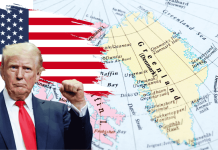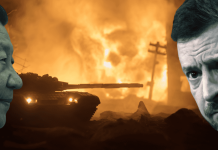As the world eagerly awaits the peace plan that U.S. President Donald Trump is reportedly working on to end the three-year-old war in Ukraine, it is becoming increasingly apparent from his latest comments that whatever the plan may be, he is ushering in a marked change in traditional American foreign policy over the next four years.
Trump is quite emphatic that from now on, Washington’s support for any country will be conditional. No American military or economic aid is going to be a one-way street. The aid recipient, even if it is an ally or partner, must contribute to American security, economic resilience, or industrial capacity.
For this reason, Washington’s relations with the rest of the world will be more and more transactional rather than value-based or ideological.
Under this principle, if Trump is to help Ukraine for its survival, then Ukraine must invest in America’s future by allowing access to its precious minerals vital to U.S. defense and high-tech industries.
Trump has been unambiguous in conveying a message to Ukraine that he is not like his predecessor, Joe Biden, who provided it unconditionally around US$300 billion, including US$65.9 billion in military assistance since Russia launched its full-scale invasion of the country in February 2022.
Speaking to reporters at the White House on February 3, Trump said he wanted “equalization” from Ukraine for Washington’s “close to US$300 billion” support.
“We’re telling Ukraine they have very valuable rare earths,” he said, adding, “We’re looking to do a deal with Ukraine where they’re going to secure what we’re giving them with their rare earths and other things.”

The rare earth minerals that President Trump talked about refer to a group of 17 elements prized for their unique magnetic and electrochemical properties. They are used in many modern products, from smartphones to computers, electric vehicle batteries, cutting-edge energy technology, missiles, and cancer treatment drugs.
At the moment, the U.S. imports most of them from China.
It may be noted that the U.S. identifies 50 minerals as critical to its economy, of which it is entirely dependent on imports of 12 and more than 50% dependent on imports of a further 16, according to the United States Geological Survey.
Reportedly, Ukraine has deposits of 22 of these 50 critical materials. The country is particularly rich in graphite, lithium, titanium, beryllium, and Uranium.
In a 2024 assessment, the United States Geological Survey estimated there were 110 million tonnes of rare-earth deposits worldwide, including 44 million in China – by far the world’s largest producer, followed by Brazil with 22 million tonnes, Vietnam with 21 million tonnes, Russia with 10 million tonnes, and India with seven million tonnes.
However, extracting or mining them is not easy as it requires heavy chemical use, resulting in huge amounts of toxic waste causing severe environmental degradation. Besides, as these are found in minute ore concentrations, large amounts of rock must be processed to produce the refined product, often in powder form.
China Leads
If China has taken the lead in this sector, two reasons are particularly significant. One, because of its political system, strict environmental oversight that is required in democratic countries with regard to extraction and refining operations is not an issue.
Two, China is also said to have filed a large number of patents on rare earth production, an obstacle to companies in other countries hoping to launch large-scale processing.
Thus, it is no wonder why many firms find it cheaper to ship their unprocessed ore to China for refining, further reinforcing the world’s reliance on China.
Against this background, reducing dependence on China in the rare-earth supply chain is increasingly becoming a global imperative.
Therefore, Trump’s focus on Ukraine’s mineral reserves is quite understandable. Securing an alternative source through Ukraine reduces American reliance on an adversarial regime. In a way, it also hurts Russia, another adversary dominating critical mineral production.
Incidentally, the present leadership in Ukraine has welcomed Trump’s ideas. Its rationale is that by developing its critical minerals with American help, Ukraine secures a vital revenue stream. This is crucial because the country will face a massive rebuilding effort when the war ends. Thus, Trump will be helping Ukraine’s post-war economic recovery.
“Overall, this is a positive signal,” says Oleksandr Merezhko, head of the foreign relations committee in the Ukrainian parliament. “I think that Trump has begun to understand that there is a danger that Ukraine’s strategic resources, if not helped, could end up in the hands of the authoritarian regimes. And not only Russia, but also its strategic partner China.”
Even Ukraine’s President Volodymyr Zelenskyy has said he is open to Trump’s conditional plan. “Ukraine was open to investment from partners who help us defend our land and push the enemy back with their weapons, their presence, and sanctions packages. And this is absolutely fair.” Zelenskyy has said that he had previously discussed the issue with Trump and that his teams were preparing for a visit by a U.S. delegation.
However, there is a catch. Many of the resources or minerals that Trump wants from Ukraine are said to be concentrated in the country’s east and south. But these are the very areas that have been hardest hit by the war, some of them now occupied by the Russian army.
Will Russia agree to return them? If it does return them through Trump’s peace plan, then it is actually a double victory for Zelenskyy.
Be that as it may, Trump’s conditional plan for Ukraine may well be viewed as a clearcut departure from traditional American foreign policy.
Charlton Allen, former chief executive officer and chief judicial officer of the North Carolina Industrial Commission and the founder of the Madison Center for Law & Liberty, makes a lot of sense when he argues that Trump’s shift marks the start of a new diplomatic approach, where U.S. support is given with clear conditions, not as an open-ended handout. It is the end of “Unconditional Foreign Aid.”
As he says, “For decades, U.S. foreign policy followed a Marshall Plan template, treating aid as a one-way act of goodwill and expecting little return beyond diplomatic gestures. Trump’s approach flips that model on its head. U.S. investment of billions in military and financial aid must yield strategic advantages—both in the current conflict and in America’s long-term security and economic resilience.”
For the likes of Allen, who seem to be unabashed supporters of President Trump, Ukraine must not be helped under the plea of ‘saving democracy and freedom.’
Advocates of “Realpolitik” as they are, for them, the idea that supporting Ukraine is a blank-check obligation must be rejected in favor of treating Ukraine as a strategic investment. What is important for them is America’s interests, not satisfying its ideological purity tests.
As Allen argues, “This Trump Doctrine is the realpolitik of the 21st century—a world where economic leverage is as vital as military power. The shift away from unconditional generosity is long overdue. By linking aid to access Ukraine’s untapped reserves of rare earth elements and its known deposits of critical minerals, Trump’s strategy ensures that U.S. commitments serve tangible national interests rather than vague promises of goodwill.
“Ukraine is only the beginning. The old model—where taxpayer dollars flowed outward with little expectation of return—has run its course. The United States must negotiate from strength, secure advantages, and reinforce its global position.”
Allen’s explanation is perhaps the best way to understand Trump’s mind.
- Author and veteran journalist Prakash Nanda is Chairman of the Editorial Board of the EurAsian Times and has been commenting on politics, foreign policy, and strategic affairs for nearly three decades. He is a former National Fellow of the Indian Council for Historical Research and a recipient of the Seoul Peace Prize Scholarship.
- CONTACT: prakash.nanda (at) hotmail.com




